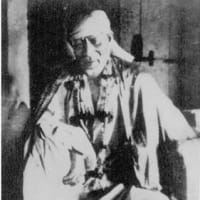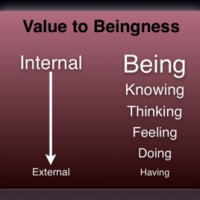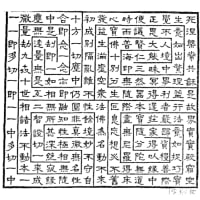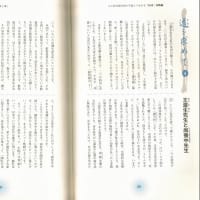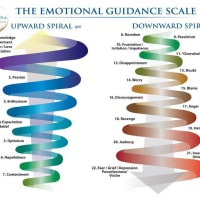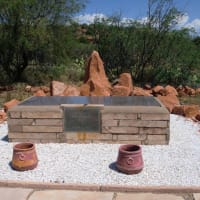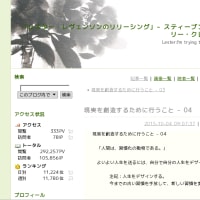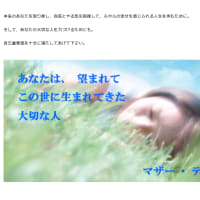Bernadette Roberts (バーナデット・ロバーツ) 1931~ (02)
前の内容:
Bernadette Roberts (バーナデット・ロバーツ) 1931~ (01)
2013-06-10 00:54:26 | 話題 (opinion)
Self
An Outline (Part One)
This is a complex chapter in which layers of insight blend and
(con)fuse, only to find an attempt at separation in her next book: 'What
is Self?'. Of course, that separation is attained by further layers of
insight, but at least that way there's bound to be something for
everyone.
By way of outline, I'll attempt to do some separation for the reader
here, but expect to sense what I sense: that blending of layers of
insight. Help from fellow Roberts watchers is openly sought! Here
goes...
In discussing self, Roberts makes clear that her knowledge of self comes
from the perspective of no-self. Traditionally, self is known by
not-self, which may otherwise be known as the personal unconscious or
the collective unconscious.
She recognizes that her view of self is so different from that of the
traditional view, that it may appear "incomprehensible and
unacceptable."
The true object of consciousness, Roberts says, is consciousness. This
is the knowing-self.
The other dimension composing the whole of consciousness is the
feeling-self, in which the object of consciousness is the senses.
Roberts compares the nature of consciousness and the nature of the
sensory system. The nature of consciousness is that of the self which
arises from the reflexive action of the mind, or the action of the mind
attending to itself. Out of this action the self arises, or thinker,
doer, feeler arises. This is the knowing-self, consciousness attending
to consciousness.
The sensory system looks not inward at itself, but outward to its
environment, for which is stands ready to respond.
The problem here, Roberts declares, is that we may fail to distinguish
between the self and sensory objects in the environment. This occurs
because the sensory objects are not seen as they are; they are seen as
filtered through the mind, and, therefore, as receivers of a stamp of
subjectivity.
This problem exists as long as the self exists, as long as the mind
bends on itself or attends to itself, as long as thinker, feeler, doer,
stand together as self.
The difference between consciousness and the senses becomes clear once
the self is no more, once the mind ceases to bend on itself.
Such was Roberts' experience. When the self disappeared into a void;
when the mind could no longer attend to itself, or look within, the
senses took over without falling into the same void as consciousness.
However, it was not only the self that had disappeared, but God too: the
union forming the Divine Awareness aspect of consciousness had
disappeared. Now it felt as though all life energy had been depleted.
This sense of life, she says, constitutes the feeling-self, which is
subtle energy located at the center of consciousness or center of being,
and whose existence depends upon the knowing-self, even as a planet
depends upon gravitational force for its placement.
It is these two divisions, the knowing self and feeling self, which form
the whole of consciousness.
With the disappearance of self and God, the entire affective system of
feeling and emotion disappeared, for it could not be kept in place any
longer.
This disappearance of the affective system, and the recognition that it
could not be resurrected, was the basis for Roberts' feelings of terror.
Once confronted, however, the terror went away and never reappeared.
And Roberts then discovered that the stillness of no-self was not
effected or moved by any terror or element of the unknown at all. She
learned, too, that the mind is ineffectual without an affective system
to work upon. And she came to see how the affective system itself is
built around a hard-nut nucleus known as "the indefinable, personal
sense of subjective energy and life."
Summarizing, Roberts says, "...self includes the entire affective
emotional network of feelings from the most subtle unconscious stirrings
of energy to the obvious extremes of passionate outbursts. Though
separate from the cognitive system, the affective life so infiltrates
the mind and all its processes that we can never separate our energies
from the cognitive faculties as long as consciousness or self remains."
In the next portion of this chapter entitled Self, Roberts continues to
develop and add to these layers of psycho-spiritual insight.
Self (Part Two)
Based upon her personal discovery, Roberts asserts that self includes
the affective system of willing, feeling, emotion, as these are
expressed along a spectrum of energy ranging from the subtle and
unconscious, to the obvious outbursts of passion. This system is
separate from the cognitive system, but it so greatly infiltrates the
mind (cognitive system) and the entire mental apparatus, that these
energies of the affective system cannot be separated from the cognitive
faculties until the no-self is experienced.
Roberts states that the extent of infiltration by the affective system
is hardly known, as we tend to believe we can be objective about it.
She looks further into the nature of the affective system. She says that
a child feels before it thinks, and in time discovers the separation
between seer and seen, and becomes self-conscious. At this point,
Roberts says, feelings become fused with knowing.
There is more to the understanding of self, she says, than being aware
of self. There must be a sense of personal feeling behind it, which
says, "this is me," "I am myself." This personal energy becomes a core
feeling, or that which makes us human. And it claims all psychic and
physical energy for its own. But it is only self, Roberts says, and "man
is more than self, more than consciousness."
So when the reflexive mechanism, or self-consciousness, closes down or
ceases to exist, the experience of psychic and physical energy goes as
well; or at least they are not experienced as before. This results in a
sense of weightlessness, of being detached from action, and this sense
continues as long as one notices or chooses to remember life prior to
the disappearance of self-consciousness, or the abilities of mind to
bend upon itself. In time, Roberts says, she acclimated to the lack of
feeling any energy.
Summarizing, Roberts says, "In the history of the self, then, physical
energy comes first, the reflexive mechanism comes next and regards this
energy as its own being. With this recognition a division is created
between physical energy and what we will now call 'self-energy', will,
mental or psychic energy, which some people believe is beyond the
physical realm."
So now instead of only the energy of the body, there arises energy of
the mind, "which resulted when the sense of personal energy infiltrated
the cognitive system to energize its thoughts and acts."
Self, then, is not merely the thinking process; it is the doer, the
experience of energy. Considering that self is the intimacy of
connection between the reflexive mechanism (knowing-self) and the
experience of energy (feeling-self), and that this intimacy is necessary
for life, it is not conceivable, Roberts says, that self can bring about
its demise.
"To think...self can get rid of itself is a contradiction," she says.
"...when the time is ripe," there is no need of self. Self seems to
outgrow its usefulness. This does not mark a falling back to an
infantile form of life, but a leap forward, a seeing of what lies beyond
the self, beyond the fulfilled human potential.
But because self cannot bring about its own demise, intervention by an
outside agent is required. This intervention ideally occurs when one
reaches the limit of human potential, for it is then when one may be
able to live without a self.
Roberts concludes that self is the "way" by which one moves to a higher
life. "Obviously, then," she says, "the purpose of having a self is to
eventually go beyond it."
She compares the oneness of self with God, and the Oneness that remains
when there is no self. The former is an experience relative to the
experiences of fragmentation or lack of wholeness. The latter Oneness is
non-relative, simply indescribable. Yet Roberts admits that a whole
self, a self that is one with God, is a necessary preparation for the
Oneness of no-self.
Self (Part Three)
This is dedicated to my friend David H.
So the core or seed of self "is our deepest experience of life and
energy." Out of this seed grows the affective system, the feeling-self,
the will, emotions and feelings.
Consider a board balanced on a fulcrum, like a child's seesaw ride,
Roberts suggests. The fulcrum is the cognitive system, the knowing-self.
The board is the affective system, the feeling self. The ends of the
board represent the extremes of attraction and repulsion, while the part
closest to the unmoving center represents subtle, unconscious
movements.
Optimum stability exists at the center of the two systems. The
non-contemplative one gains and maintains equilibrium despite forces
that exist to unbalance the whole system.
The contemplative seeks to go a step further and move from awareness of
the center point of equilibrium of the affective system, to the still
point or true center of being (I AM).
Now the will is the center of the affective system, Roberts says, and
the provider of energy for the affective system. Also, underlying the
will is the still point or true center of being. So when the will does
not move, or is free of desire, the affective system does not move, a
state of desirelessness exists, and it is easier to access the
still-point (I AM).
This center or will, can be known independent of the cognitive system,
which also touches the center of the affective system.
Once the contemplative knows the still-point (IAM) and turns attention
there, the movement of the affective system comes to a stop, and there
is a sense of stillness and peace.
The nature of this unitive state is union of human and divine will and
power, so that will is now God's will, not contrary to that. Here is
where one may become further tested by the world. Now situations arise
that would test movement of the will, test the integrity of the unitive
state. The requirement is for attention to be unceasingly on the
still-point (I AM).
What Roberts learned is that while there was no more wavering from
abidance at the still-point, no longer any tipping of the board symbolic
of the affective system, there was still the movement of the
ever-horizontal board up and down. This was Roberts way of saying that
she was tested at her innermost core.
And what she observed and discovered was that there was a gap between
herself and God. What demonstrated this gap was the initial spontaneous
movements in response to life events. These movements were automatic and
harmless, yet mystifying to Roberts, as she was not sure of their
source, whether it was herself, or God, or some subtle instinct.
But these movements demonstrated that there was a gap between herself
and God. Within that gap between the center of the board or affective
continuum, and the still-point (I AM), was the battleground between the
forces of self-preservation and self-extinction. This battleground
appeared to be separate from consciousness and untouchable, not under
one's control or will.
Seeing this battle for what it was, understanding it, the battle simply
ceased. Roberts found that the initial spontaneous movements also
stopped, and the still-point (I AM) was then able to further draw the
affective system into its silence.
When the 'drawing' was complete, the continuum was no more, self was no
more, and the still-point was no more. The gap between the still center
of the affective continuum (self) and the still-point (God) was no more.
Therefore, no self, no God there remained. Only what Is.
Self (Part Four of four)
The affective system, Roberts says, is the cause of all suffering. Out
of it arises all fear, anxiety, and psychological suffering.
It would follow, she suggests, that those who have lost the affective
system, are free of psychological disorders and would have no reason to
seek professional help, and that is why the psychiatric literature has
no description of those who have gone beyond the self.
Among the questions that arise is the concern that the lack of an
affective system might lead to lives that are cold, detached,
robot-like. Roberts says that one has to live the no-self life to
understand it.
She says, "All that need be said is that it is a dynamic, intense state
of taking care of whatever arises in the now-moment. It is a continuous
waking state in which the physical organism remains sensitive,
responsive, and totally unimpaired. When fully adjusted to the dimension
of no-self, nothing is found to be missing or wanting. It is only in the
encounter with other selves that a self or affective system is a
reminder of what >was<."
She says that one of the reasons people cannot imagine life without an
affective system is that few grasp the whole picture of what the
affective system is. It is not merely the extremes of love and hate. It
is personal energy and will, and these giving rise to all desire, and
these desires or expectations coloring our world, our thoughts and
perceptions, our experiences, our spiritual experiences of love, bliss,
lights, visions, sounds, ecstasies, etc.
It is all the self, the affective system. It is who we are fooled into
believing who we are.
So when the affective system, our psychological familiarity, our
spiritual feeling, our desires, our self, falls away, what is left to
serve as a standard? There are no standards, no values, from the
perspective of the no-self.
The no-self needs no values. It is already in the now moment. There are
no options to consider, no standards to consult. The no-self is so empty
that is is empty of love, bliss and joy, and empty of hate, sadness and
evil. It is in the now moment. The practice of virtue is absent. Virtue
is simply present. The bottom line is that the will, which is the core
of the affective system, disappears, and it was will that had put virtue
and vice into motion in the first place.
This was Roberts' major discovery about the self: "that its very nucleus
is the will or volitional faculty." When the affective system first
falls away, it is the will that abruptly goes, and later the emotions
and feelings.
One of the difficult aspects of the journey, then, is acclimating to a
lack of movement of the will, or the complete dissipation of personal
energy. That is why lifelessness and lack of energy were experienced by
her along with the disappearance of the self.
In fact, much of Roberts' journey was the process of becoming accustomed
to life without personal energy (or will) and without the experiences
personal energy draws and gathers. And when personal energy is no more,
perhaps, Roberts suggest, it is easier to see how there would be no
results of that energy: no virtues, no vices.
So there is only living in the now moment, without feelings or practice
of virtue, without struggling or the measuring of action. Roberts says,
"Somehow each moment contains within itself the appropriate action for
each tiny event in life without the need for thought or feeling."
She calls the preceding description, "doing." Because of the extreme
condition out of which "doing" arises, it is very difficult to
understand, and it raises many questions pertaining to ethics, morals,
society, and so on.
>From all this, Roberts asserts, it follows that there is a better way of
knowing a person than by the fruits of their actions (which sounds, and
is, contrary to a Christian standard.) And that better way is by knowing
God, and not by knowing the person at all.
For how can we know another when there is no self, no other, as such?
And how, then, can there be a relationship? Again, this becomes very
difficult to grasp as virtually everyone is dependent upon
relationships, even those who have strong inner resources may not be
strong enough to be independent (not absent) of relationships.
People who are dependent upon relationships tend to view life as an "I"
and an "other" affair. The true Other, and therefore the true "I", is
found by turning within, not outward toward another.
Once wholeness is won by the turning within, then one can withstand
relationships with other people, be truly generous, and be conscious in
love, wanting only growth for the other, whatever that may mean.
And what is the true Other? It is the still-point at the center of our
being. "The real problem in life, then, is not between people, but
between the individual and his true Other," says Roberts.
And so having found the Other, relationships are founded on That. We now
love not the affective, emotional self of the one with whom we are in
relationship, but the true Other, the still-point, God in others.
Roberts admits that is not so straightforward a seeing. First one must
face and see the individual. And, secondly, see God.
It is only after the self disappears that the self in others disappears,
and that only God is seen in the other, and the individual fades into
still-point awareness.
This sameness of seeing God, and the goneness of emotion is not as plain
and boring as it sounds. Roberts points out that infinite varieties of
shapes and forms are made out of the same clay. Even individuality
exists in the absence of self. People with no self, and snowflakes, have
no self.
What is really plain and boring, Roberts says, is the self, the
emotions, self-identity, self-possession, the 'I am this', and the 'I am
that'.
The life beyond the self is more free, open and diverse, as it is
centered in the right place: the still point, the I AM.
Summarizing what she learned about the self, Roberts says that a self is
necessary in order to know, feel, and experience. It protects us against
death. It is necessary for survival and existence.
Just as self is developed, a time comes when it passes and fades away.
This movement, all movement through all steps of growth, is the only
thing that neither changes nor passes away.
The contemplative is one who is aware of the movement, first working at
going with it, later discovering he is effortlessly moving with it,
finally realizing that he is the movement Itself.
Conclusion
Roberts reveals that she had not taken her journey alone, but that her
friend and neighbor Lucille, who was 85 at the time, had also undergone
an experience of losing the self. Lucille understood it to be part of
the aging process, a preparation for death. And the stages Lucille went
through paralleled the experiences of Roberts.
The major differences were that Lucille's loss of self occurred slowly
over a period of years, whereas Roberts' changes were abrupt and within
a narrow time frame of two years; and that for Roberts the mystery lie
in what remains when the self is gone, and for Lucille the mystery lie
in how much of her self she could live without; and for Lucille, the
complete loss of self meant presence in God and the end of her life,
while for Roberts loss of self meant the beginning of life.
Roberts states the two broad views afforded by her spiritual journey.
One is that the loss of self and the realization of what remains is the
second part of a journey to God; The second view is that loss of self is
a natural part of the life span, as one prepares to meet what lies
beyond the self.
Whether the self is lost through the contemplative tradition or as the
result of aging, what lies beyond the self invites one not to an end of
any sort, but to a new beginning.
The contemplative's role in society, she believes, is to tell us about a
transition or crossing over that each one of us will make, that some may
be in the midst of making.
Roberts very briefly compares her experiences to those of the mystics.
She says St. Theresa and St. John of the Cross had glimpses of the
no-self and perceived them as transitory, not a doorway to the greatest
depth.
Only Meister Eckhart, Roberts says, spoke of the step beyond union of
self and God. Eckhart, she says, picked-up where St. Thomas Aquinas left
off. She says the two should be studied together in order to gain
knowledge of a full contemplative system.
The Spanish mystics, Roberts contends, in order to uphold theological
propriety, revealed only as much as Thomistic or speculative confines
would allow.
Roberts points out that the mystic depends upon the separation of God
and self for his mysticism, for his oneness experience that he or she so
values. But the no-self experience becomes the Only God experience, and
with God eternally accessible, where is the mystical experience, the
lights and visions? It is the end of the mystical life and the beginning
of real life.
And that is what Roberts is talking about all along. She repeats that
there is the theologically defined oneness of self with God, known in
its highest category by the mystics; and there is "undefineable
essential Oneness" beyond self and God, which theology does not deal
with. It is the becoming of God, not merely the relationship with God.
These are the two ways of seeing and knowing.
In concluding her book, Roberts states that it clears the ground for
much more to be said about this contemplative movement of the loss of
self and Divine Oneness.
She says she is concerned for others who may find themselves moving
beyond the mystical union, beyond the union of self and God. And she
feels it is a grave mistake to think that mystical union is the final
stage.
She urges the mystic to release the experience of unity and all the
feelings associated with it, and to move beyond. She urges that any self
at all, even the divine self, must be released.
That crossing of the line into the unknown is done by God alone. The
self never crosses the line, it simply ceases to exist. (Aside: it
reminds of a mug I have that says upon it, "Old waitresses don't die,
they just give up their stations.")
"For if truth be known," Roberts says, "only Christ dies and only Christ
rises."
She quotes Matthew 10:39: "He who seeks only himself brings himself to
ruin, whereas he who brings himself to naught for me discovers who he
is."
Roberts adds that he will discover not only 'who' he is, but 'what',
'where', and 'that' he is, in God, and that outside God, nothing is.
NONDUALITY.COM
THE FIRST INDEPENDENT NONDUALITY SITE
FOUNDED 1997
前の内容:
Bernadette Roberts (バーナデット・ロバーツ) 1931~ (01)
2013-06-10 00:54:26 | 話題 (opinion)
Self
An Outline (Part One)
This is a complex chapter in which layers of insight blend and
(con)fuse, only to find an attempt at separation in her next book: 'What
is Self?'. Of course, that separation is attained by further layers of
insight, but at least that way there's bound to be something for
everyone.
By way of outline, I'll attempt to do some separation for the reader
here, but expect to sense what I sense: that blending of layers of
insight. Help from fellow Roberts watchers is openly sought! Here
goes...
In discussing self, Roberts makes clear that her knowledge of self comes
from the perspective of no-self. Traditionally, self is known by
not-self, which may otherwise be known as the personal unconscious or
the collective unconscious.
She recognizes that her view of self is so different from that of the
traditional view, that it may appear "incomprehensible and
unacceptable."
The true object of consciousness, Roberts says, is consciousness. This
is the knowing-self.
The other dimension composing the whole of consciousness is the
feeling-self, in which the object of consciousness is the senses.
Roberts compares the nature of consciousness and the nature of the
sensory system. The nature of consciousness is that of the self which
arises from the reflexive action of the mind, or the action of the mind
attending to itself. Out of this action the self arises, or thinker,
doer, feeler arises. This is the knowing-self, consciousness attending
to consciousness.
The sensory system looks not inward at itself, but outward to its
environment, for which is stands ready to respond.
The problem here, Roberts declares, is that we may fail to distinguish
between the self and sensory objects in the environment. This occurs
because the sensory objects are not seen as they are; they are seen as
filtered through the mind, and, therefore, as receivers of a stamp of
subjectivity.
This problem exists as long as the self exists, as long as the mind
bends on itself or attends to itself, as long as thinker, feeler, doer,
stand together as self.
The difference between consciousness and the senses becomes clear once
the self is no more, once the mind ceases to bend on itself.
Such was Roberts' experience. When the self disappeared into a void;
when the mind could no longer attend to itself, or look within, the
senses took over without falling into the same void as consciousness.
However, it was not only the self that had disappeared, but God too: the
union forming the Divine Awareness aspect of consciousness had
disappeared. Now it felt as though all life energy had been depleted.
This sense of life, she says, constitutes the feeling-self, which is
subtle energy located at the center of consciousness or center of being,
and whose existence depends upon the knowing-self, even as a planet
depends upon gravitational force for its placement.
It is these two divisions, the knowing self and feeling self, which form
the whole of consciousness.
With the disappearance of self and God, the entire affective system of
feeling and emotion disappeared, for it could not be kept in place any
longer.
This disappearance of the affective system, and the recognition that it
could not be resurrected, was the basis for Roberts' feelings of terror.
Once confronted, however, the terror went away and never reappeared.
And Roberts then discovered that the stillness of no-self was not
effected or moved by any terror or element of the unknown at all. She
learned, too, that the mind is ineffectual without an affective system
to work upon. And she came to see how the affective system itself is
built around a hard-nut nucleus known as "the indefinable, personal
sense of subjective energy and life."
Summarizing, Roberts says, "...self includes the entire affective
emotional network of feelings from the most subtle unconscious stirrings
of energy to the obvious extremes of passionate outbursts. Though
separate from the cognitive system, the affective life so infiltrates
the mind and all its processes that we can never separate our energies
from the cognitive faculties as long as consciousness or self remains."
In the next portion of this chapter entitled Self, Roberts continues to
develop and add to these layers of psycho-spiritual insight.
Self (Part Two)
Based upon her personal discovery, Roberts asserts that self includes
the affective system of willing, feeling, emotion, as these are
expressed along a spectrum of energy ranging from the subtle and
unconscious, to the obvious outbursts of passion. This system is
separate from the cognitive system, but it so greatly infiltrates the
mind (cognitive system) and the entire mental apparatus, that these
energies of the affective system cannot be separated from the cognitive
faculties until the no-self is experienced.
Roberts states that the extent of infiltration by the affective system
is hardly known, as we tend to believe we can be objective about it.
She looks further into the nature of the affective system. She says that
a child feels before it thinks, and in time discovers the separation
between seer and seen, and becomes self-conscious. At this point,
Roberts says, feelings become fused with knowing.
There is more to the understanding of self, she says, than being aware
of self. There must be a sense of personal feeling behind it, which
says, "this is me," "I am myself." This personal energy becomes a core
feeling, or that which makes us human. And it claims all psychic and
physical energy for its own. But it is only self, Roberts says, and "man
is more than self, more than consciousness."
So when the reflexive mechanism, or self-consciousness, closes down or
ceases to exist, the experience of psychic and physical energy goes as
well; or at least they are not experienced as before. This results in a
sense of weightlessness, of being detached from action, and this sense
continues as long as one notices or chooses to remember life prior to
the disappearance of self-consciousness, or the abilities of mind to
bend upon itself. In time, Roberts says, she acclimated to the lack of
feeling any energy.
Summarizing, Roberts says, "In the history of the self, then, physical
energy comes first, the reflexive mechanism comes next and regards this
energy as its own being. With this recognition a division is created
between physical energy and what we will now call 'self-energy', will,
mental or psychic energy, which some people believe is beyond the
physical realm."
So now instead of only the energy of the body, there arises energy of
the mind, "which resulted when the sense of personal energy infiltrated
the cognitive system to energize its thoughts and acts."
Self, then, is not merely the thinking process; it is the doer, the
experience of energy. Considering that self is the intimacy of
connection between the reflexive mechanism (knowing-self) and the
experience of energy (feeling-self), and that this intimacy is necessary
for life, it is not conceivable, Roberts says, that self can bring about
its demise.
"To think...self can get rid of itself is a contradiction," she says.
"...when the time is ripe," there is no need of self. Self seems to
outgrow its usefulness. This does not mark a falling back to an
infantile form of life, but a leap forward, a seeing of what lies beyond
the self, beyond the fulfilled human potential.
But because self cannot bring about its own demise, intervention by an
outside agent is required. This intervention ideally occurs when one
reaches the limit of human potential, for it is then when one may be
able to live without a self.
Roberts concludes that self is the "way" by which one moves to a higher
life. "Obviously, then," she says, "the purpose of having a self is to
eventually go beyond it."
She compares the oneness of self with God, and the Oneness that remains
when there is no self. The former is an experience relative to the
experiences of fragmentation or lack of wholeness. The latter Oneness is
non-relative, simply indescribable. Yet Roberts admits that a whole
self, a self that is one with God, is a necessary preparation for the
Oneness of no-self.
Self (Part Three)
This is dedicated to my friend David H.
So the core or seed of self "is our deepest experience of life and
energy." Out of this seed grows the affective system, the feeling-self,
the will, emotions and feelings.
Consider a board balanced on a fulcrum, like a child's seesaw ride,
Roberts suggests. The fulcrum is the cognitive system, the knowing-self.
The board is the affective system, the feeling self. The ends of the
board represent the extremes of attraction and repulsion, while the part
closest to the unmoving center represents subtle, unconscious
movements.
Optimum stability exists at the center of the two systems. The
non-contemplative one gains and maintains equilibrium despite forces
that exist to unbalance the whole system.
The contemplative seeks to go a step further and move from awareness of
the center point of equilibrium of the affective system, to the still
point or true center of being (I AM).
Now the will is the center of the affective system, Roberts says, and
the provider of energy for the affective system. Also, underlying the
will is the still point or true center of being. So when the will does
not move, or is free of desire, the affective system does not move, a
state of desirelessness exists, and it is easier to access the
still-point (I AM).
This center or will, can be known independent of the cognitive system,
which also touches the center of the affective system.
Once the contemplative knows the still-point (IAM) and turns attention
there, the movement of the affective system comes to a stop, and there
is a sense of stillness and peace.
The nature of this unitive state is union of human and divine will and
power, so that will is now God's will, not contrary to that. Here is
where one may become further tested by the world. Now situations arise
that would test movement of the will, test the integrity of the unitive
state. The requirement is for attention to be unceasingly on the
still-point (I AM).
What Roberts learned is that while there was no more wavering from
abidance at the still-point, no longer any tipping of the board symbolic
of the affective system, there was still the movement of the
ever-horizontal board up and down. This was Roberts way of saying that
she was tested at her innermost core.
And what she observed and discovered was that there was a gap between
herself and God. What demonstrated this gap was the initial spontaneous
movements in response to life events. These movements were automatic and
harmless, yet mystifying to Roberts, as she was not sure of their
source, whether it was herself, or God, or some subtle instinct.
But these movements demonstrated that there was a gap between herself
and God. Within that gap between the center of the board or affective
continuum, and the still-point (I AM), was the battleground between the
forces of self-preservation and self-extinction. This battleground
appeared to be separate from consciousness and untouchable, not under
one's control or will.
Seeing this battle for what it was, understanding it, the battle simply
ceased. Roberts found that the initial spontaneous movements also
stopped, and the still-point (I AM) was then able to further draw the
affective system into its silence.
When the 'drawing' was complete, the continuum was no more, self was no
more, and the still-point was no more. The gap between the still center
of the affective continuum (self) and the still-point (God) was no more.
Therefore, no self, no God there remained. Only what Is.
Self (Part Four of four)
The affective system, Roberts says, is the cause of all suffering. Out
of it arises all fear, anxiety, and psychological suffering.
It would follow, she suggests, that those who have lost the affective
system, are free of psychological disorders and would have no reason to
seek professional help, and that is why the psychiatric literature has
no description of those who have gone beyond the self.
Among the questions that arise is the concern that the lack of an
affective system might lead to lives that are cold, detached,
robot-like. Roberts says that one has to live the no-self life to
understand it.
She says, "All that need be said is that it is a dynamic, intense state
of taking care of whatever arises in the now-moment. It is a continuous
waking state in which the physical organism remains sensitive,
responsive, and totally unimpaired. When fully adjusted to the dimension
of no-self, nothing is found to be missing or wanting. It is only in the
encounter with other selves that a self or affective system is a
reminder of what >was<."
She says that one of the reasons people cannot imagine life without an
affective system is that few grasp the whole picture of what the
affective system is. It is not merely the extremes of love and hate. It
is personal energy and will, and these giving rise to all desire, and
these desires or expectations coloring our world, our thoughts and
perceptions, our experiences, our spiritual experiences of love, bliss,
lights, visions, sounds, ecstasies, etc.
It is all the self, the affective system. It is who we are fooled into
believing who we are.
So when the affective system, our psychological familiarity, our
spiritual feeling, our desires, our self, falls away, what is left to
serve as a standard? There are no standards, no values, from the
perspective of the no-self.
The no-self needs no values. It is already in the now moment. There are
no options to consider, no standards to consult. The no-self is so empty
that is is empty of love, bliss and joy, and empty of hate, sadness and
evil. It is in the now moment. The practice of virtue is absent. Virtue
is simply present. The bottom line is that the will, which is the core
of the affective system, disappears, and it was will that had put virtue
and vice into motion in the first place.
This was Roberts' major discovery about the self: "that its very nucleus
is the will or volitional faculty." When the affective system first
falls away, it is the will that abruptly goes, and later the emotions
and feelings.
One of the difficult aspects of the journey, then, is acclimating to a
lack of movement of the will, or the complete dissipation of personal
energy. That is why lifelessness and lack of energy were experienced by
her along with the disappearance of the self.
In fact, much of Roberts' journey was the process of becoming accustomed
to life without personal energy (or will) and without the experiences
personal energy draws and gathers. And when personal energy is no more,
perhaps, Roberts suggest, it is easier to see how there would be no
results of that energy: no virtues, no vices.
So there is only living in the now moment, without feelings or practice
of virtue, without struggling or the measuring of action. Roberts says,
"Somehow each moment contains within itself the appropriate action for
each tiny event in life without the need for thought or feeling."
She calls the preceding description, "doing." Because of the extreme
condition out of which "doing" arises, it is very difficult to
understand, and it raises many questions pertaining to ethics, morals,
society, and so on.
>From all this, Roberts asserts, it follows that there is a better way of
knowing a person than by the fruits of their actions (which sounds, and
is, contrary to a Christian standard.) And that better way is by knowing
God, and not by knowing the person at all.
For how can we know another when there is no self, no other, as such?
And how, then, can there be a relationship? Again, this becomes very
difficult to grasp as virtually everyone is dependent upon
relationships, even those who have strong inner resources may not be
strong enough to be independent (not absent) of relationships.
People who are dependent upon relationships tend to view life as an "I"
and an "other" affair. The true Other, and therefore the true "I", is
found by turning within, not outward toward another.
Once wholeness is won by the turning within, then one can withstand
relationships with other people, be truly generous, and be conscious in
love, wanting only growth for the other, whatever that may mean.
And what is the true Other? It is the still-point at the center of our
being. "The real problem in life, then, is not between people, but
between the individual and his true Other," says Roberts.
And so having found the Other, relationships are founded on That. We now
love not the affective, emotional self of the one with whom we are in
relationship, but the true Other, the still-point, God in others.
Roberts admits that is not so straightforward a seeing. First one must
face and see the individual. And, secondly, see God.
It is only after the self disappears that the self in others disappears,
and that only God is seen in the other, and the individual fades into
still-point awareness.
This sameness of seeing God, and the goneness of emotion is not as plain
and boring as it sounds. Roberts points out that infinite varieties of
shapes and forms are made out of the same clay. Even individuality
exists in the absence of self. People with no self, and snowflakes, have
no self.
What is really plain and boring, Roberts says, is the self, the
emotions, self-identity, self-possession, the 'I am this', and the 'I am
that'.
The life beyond the self is more free, open and diverse, as it is
centered in the right place: the still point, the I AM.
Summarizing what she learned about the self, Roberts says that a self is
necessary in order to know, feel, and experience. It protects us against
death. It is necessary for survival and existence.
Just as self is developed, a time comes when it passes and fades away.
This movement, all movement through all steps of growth, is the only
thing that neither changes nor passes away.
The contemplative is one who is aware of the movement, first working at
going with it, later discovering he is effortlessly moving with it,
finally realizing that he is the movement Itself.
Conclusion
Roberts reveals that she had not taken her journey alone, but that her
friend and neighbor Lucille, who was 85 at the time, had also undergone
an experience of losing the self. Lucille understood it to be part of
the aging process, a preparation for death. And the stages Lucille went
through paralleled the experiences of Roberts.
The major differences were that Lucille's loss of self occurred slowly
over a period of years, whereas Roberts' changes were abrupt and within
a narrow time frame of two years; and that for Roberts the mystery lie
in what remains when the self is gone, and for Lucille the mystery lie
in how much of her self she could live without; and for Lucille, the
complete loss of self meant presence in God and the end of her life,
while for Roberts loss of self meant the beginning of life.
Roberts states the two broad views afforded by her spiritual journey.
One is that the loss of self and the realization of what remains is the
second part of a journey to God; The second view is that loss of self is
a natural part of the life span, as one prepares to meet what lies
beyond the self.
Whether the self is lost through the contemplative tradition or as the
result of aging, what lies beyond the self invites one not to an end of
any sort, but to a new beginning.
The contemplative's role in society, she believes, is to tell us about a
transition or crossing over that each one of us will make, that some may
be in the midst of making.
Roberts very briefly compares her experiences to those of the mystics.
She says St. Theresa and St. John of the Cross had glimpses of the
no-self and perceived them as transitory, not a doorway to the greatest
depth.
Only Meister Eckhart, Roberts says, spoke of the step beyond union of
self and God. Eckhart, she says, picked-up where St. Thomas Aquinas left
off. She says the two should be studied together in order to gain
knowledge of a full contemplative system.
The Spanish mystics, Roberts contends, in order to uphold theological
propriety, revealed only as much as Thomistic or speculative confines
would allow.
Roberts points out that the mystic depends upon the separation of God
and self for his mysticism, for his oneness experience that he or she so
values. But the no-self experience becomes the Only God experience, and
with God eternally accessible, where is the mystical experience, the
lights and visions? It is the end of the mystical life and the beginning
of real life.
And that is what Roberts is talking about all along. She repeats that
there is the theologically defined oneness of self with God, known in
its highest category by the mystics; and there is "undefineable
essential Oneness" beyond self and God, which theology does not deal
with. It is the becoming of God, not merely the relationship with God.
These are the two ways of seeing and knowing.
In concluding her book, Roberts states that it clears the ground for
much more to be said about this contemplative movement of the loss of
self and Divine Oneness.
She says she is concerned for others who may find themselves moving
beyond the mystical union, beyond the union of self and God. And she
feels it is a grave mistake to think that mystical union is the final
stage.
She urges the mystic to release the experience of unity and all the
feelings associated with it, and to move beyond. She urges that any self
at all, even the divine self, must be released.
That crossing of the line into the unknown is done by God alone. The
self never crosses the line, it simply ceases to exist. (Aside: it
reminds of a mug I have that says upon it, "Old waitresses don't die,
they just give up their stations.")
"For if truth be known," Roberts says, "only Christ dies and only Christ
rises."
She quotes Matthew 10:39: "He who seeks only himself brings himself to
ruin, whereas he who brings himself to naught for me discovers who he
is."
Roberts adds that he will discover not only 'who' he is, but 'what',
'where', and 'that' he is, in God, and that outside God, nothing is.
NONDUALITY.COM
THE FIRST INDEPENDENT NONDUALITY SITE
FOUNDED 1997










